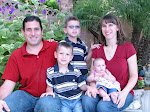I opened this discussion, on my group page, by quoting the famed theologian A.W. Tozer. He opens his magnum opus, The Knowledge of the Holy by saying, "What comes into our mind when we think about God is the most important thing about us." Such a statement assaults the post-modern mind, which values a supposed set of shared common values, which cannot possibly be related to something as scandalous as what a person actually thinks about God!
I remember watching a celebration of such "common values" when the networks aired Michael Jackson's memorial service. The celebrity supporters gathered and serenaded the audience with an emotional rendition of "We Are the World." Behind them various religious symbols from all faiths were projected onto screens as they sang. The message was clear. We are the world and it doesn't matter what religion you practice. As human beings we are all united by the fact we share this world.
The problem of such a Utopian ideal is, of course, that it is patently untrue. We are not the world in any unified sense. We usually can't even get along in our own neighborhoods. We are a world living under the threat of constant terrorism, fractured by multiple wars, indifferent to the suffering of so many in our world, unmoved to lift our hands together against poverty and starvation, and holding little regard for justice unless we ourselves are treated unjustly.
Could it be that what we think about God might impact us a little more than many post-modern pundits would have us to believe? In reading through the Old Testament, one cannot help but to be struck by how different (holy) the people of God (Israel) were to live. What they thought about God made all the difference in the world. They were to care about justice, because they served a just God, even one who loved the alien among them. They were to have a compassion on the poor, the orphan, and the widow, because their God was a God abounding in love and compassion.
As the story of Israel goes, they often forgot their theology. They turned and worshiped other gods, including Molech. In doing so, they abandoned compassion and began to sacrifice their children by fire. How could they do such a reprehensible deed? Because they exchanged the holy and loving Yahweh for the unholy and unloving god Molech.
You can't force anyone to think about God the way you do, though it might be good to be verbally and kindly persuasive, if possible. My point is that what you think about God has everything to do with the kind of person you are and the life you live. Nothing about us could be more relevant. We become like what we worship.
The gods of today are not so despicable as Molech (in most cases), so we don't have people sacrificing their children in the fire. I recognize the common human dignity we share with all people on the planet and I do not doubt that people of all religions or no religion can do amazingly good deeds and admirable acts of compassion. There is a sense that a basic set of common values are evident to all regardless of their theology. As a theologian, I would argue that such values are obvious only because we are created in the image of God.
However, in the end, we are still becoming like whom we worship. So, isn't it amazing that in living in such an enlightened culture that so extols the virtues of common values that we have sacrificed untold millions of unborn children to the gods of choice, individualism, and convenience? Is this the world meant by Jackson's "We Are the World"? Are we capable of such capricious elimination of life and at the same time rousing demonstrations of compassion, like we have seen in the aftermath of the Haiti quake?
This is simply the reality of being human beings with our all too common values. As long as we worship humankind as the highest ideal we will never transcend that reality. Maybe Tozer was right: "What comes into our mind when we think about God is the most important thing about us."
